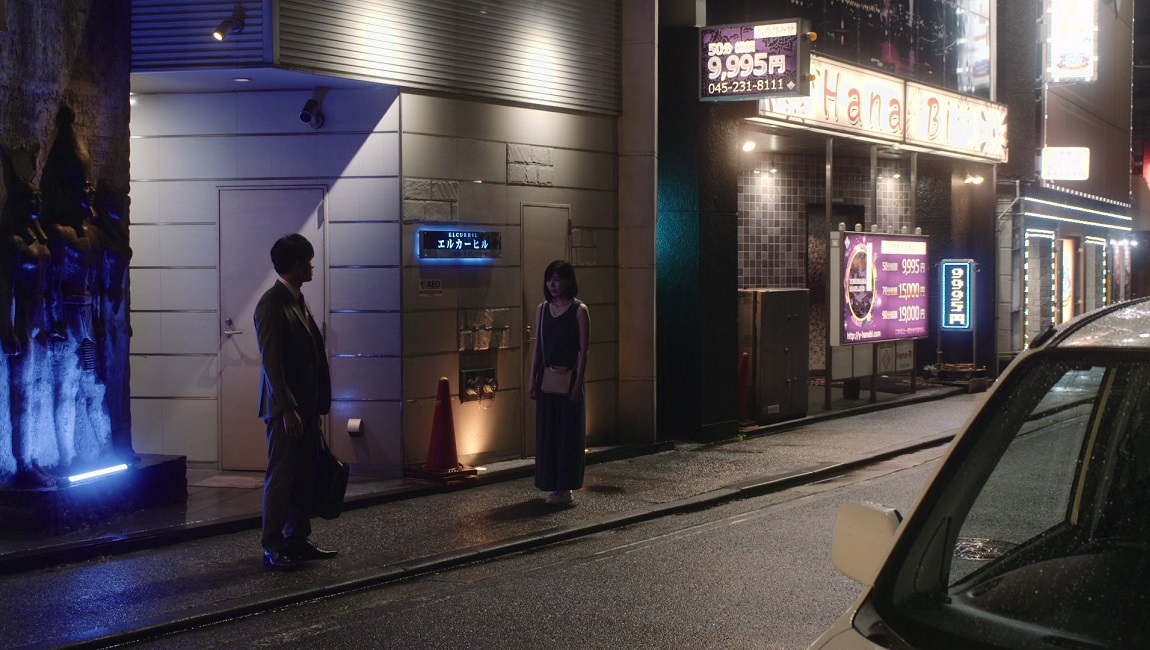The Whaler Boy undermines any potential for naturalism and rawness with slick artifice and discordant commercial style.
Philipp Yuryev’s debut feature The Whaler Boy takes us to the far reaches of the Chukotka Peninsula, the northeastern edge of Russia’s territory, with only fifty-five miles of Bering Strait separating it from Alaska and the United States. This distance between the two countries forms the thematic bedrock of the film, and at its outset, Yuryev crosses this gap metaphorically. We open on a seedy Detroit club, as we watch a camgirl (Kristina Asmus) preparing to start her show. A match cut transports us to a laptop in a small Chukotkan whaling village, a gaggle of local whale hunters huddled around it watching in silence. This opening — presented with oversaturated neons, jaunty pink typeface, and a Johnny Cash needle-drop — hints toward the film’s central flaw: Yuryev’s approach smothers the naturalism of the on-location shoot and presence of nonprofessional actors with an overproduced slickness that hangs over the film like a cheap suit. Those expecting the type of introspective rawness evident in Dmitry Davydov’s Scarecrow, a far more incisive exploration of village life in the Russian outskirts set in the neighboring Sakha Republic, will find themselves disappointed by The Whaler Boy‘s commercial sensibility and sheen.
At the heart of the film is Leshka (Vladimir Onokhov), a fifteen-year-old whale hunter who finds himself falling in love with the camgirl of the intro, known to him only by her screen name: HollySweet_999. This parasocial love affair — Leshka merely watches her streams and, despite attempts to learn some English phrases, is not even able to enter a private chat with her — forms the film’s allegorical foundations: the harsh realities of life in the tundra with the almost visible yet ultimately unreachable promise of the American dream just next door. It’s fascinating to hear Yuryev describe his reasoning behind filming in 4:3 — ostensibly to avoid the temptation to ogle the gorgeous landscapes in pristine widescreen — an admirable goal given how this exact style of postcard porn grated alongside attempts to depict poverty in Chloé Zhao’s Nomadland. However, a frustrating romanticization seeps in even given the constraints of the boxy aspect ratio, and Yuryev’s combined implementations of soft focus, pop music needle-drops, drone shots, and pristine compositions have a nearly identical effect, submerging even the authentic whale hunt sequences under a thick layer of artifice.
Meanwhile, Onokhov’s engrossing presence as Leshka is undermined by a heavy-handed script that demands an awkward and unbelievable degree of naivete from the young man. The contrivance of this quixotic dream, his drive to escape to Detroit to be with this woman, works in tandem with the film’s slickness to undercut its emotional underpinnings. It often feels like the lumbering weight of the allegory at large — the brute realities of village life contrasted with the vagaries of the American promise — overwhelm the more nuanced truths lurking just below the surface. Then again, perhaps expectations for what The Whaler Boy could have been might have been set a bit high by its success in Venice. A glance through Yuryev’s short films will lead you to a number of commercials tinged with a similar type of faux-Terrence Malick slickness, an affected air of significance hovering above a shallow inner core. What’s even worse is seeing this type of spot for ExxonMobil prominently featured in the director’s portfolio, a company whose drilling operations in Chukotka pose a devastating threat to the stability of the region’s ecosystems and the very way of life of the people who live there. It reflects a superficiality that feels intrinsic to the director’s style, and results in a film where the divide between what could have been and what is put to screen is yawning.







